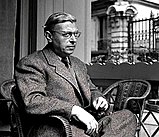
Back Eksistensialisme Afrikaans Existenzialismus ALS ኅልውነት Amharic وجودية Arabic وجوديه ARZ Esistencialismu AST Ekzistensializm Azerbaijani واراولوشچولوق AZB Экзистенциализм Bashkir Экзістэнцыялізм Byelorussian
Existentialism is a form of philosophical inquiry that explores the issue of human existence.[1][2] Existentialist philosophers explore questions related to the meaning, purpose, and value of human existence. Common concepts in existentialist thought include existential crisis, dread, and anxiety in the face of an absurd world and free will, as well as authenticity, courage, and virtue.[3]
Existentialism is associated with several 19th- and 20th-century European philosophers who shared an emphasis on the human subject, despite often profound differences in thought.[4][2][5] Among the earliest figures associated with existentialism are philosophers Søren Kierkegaard, Friedrich Nietzsche and novelist Fyodor Dostoevsky, all of whom critiqued rationalism and concerned themselves with the problem of meaning. In the 20th century, prominent existentialist thinkers included Jean-Paul Sartre, Albert Camus, Martin Heidegger, Simone de Beauvoir, Karl Jaspers, Gabriel Marcel, and Paul Tillich.
Many existentialists considered traditional systematic or academic philosophies, in style and content, to be too abstract and removed from concrete human experience.[6][7] A primary virtue in existentialist thought is authenticity.[8] Existentialism would influence many disciplines outside of philosophy, including theology, drama, art, literature, and psychology.[9]
Existentialist philosophy encompasses a range of perspectives, but it shares certain underlying concepts. Among these, a central tenet of existentialism is that personal freedom, individual responsibility, and deliberate choice are essential to the pursuit of self-discovery and the determination of life's meaning.[10]
- ^ Lavrin, Janko (1971). Nietzsche: A Biographical Introduction. Charles Scribner's Sons. p. 43.
- ^ a b Macquarrie, John (1972). Existentialism. New York: Penguin. pp. 14–15.
- ^ Solomon, Robert C. (1974). Existentialism. McGraw-Hill. pp. 1–2.
- ^ Crowell, Steven (October 2010). "Existentialism". Stanford Encyclopedia of Philosophy.
- ^ Honderich, Ted, ed. (1995). Oxford Companion to Philosophy. New York: Oxford University Press. p. 259. ISBN 978-0-19-866132-0.
- ^ Breisach, Ernst (1962). Introduction to Modern Existentialism. New York: Grove Press. p. 5.
- ^ Kaufmann, Walter (1956). Existentialism: From Dostoyevesky to Sartre. New York: Meridian. p. 12.
- ^ Flynn 2006, p. xi.
- ^ Guignon, Charles B.; Pereboom, Derk (2001). Existentialism: Basic Writings. Hackett Publishing. p. xiii. ISBN 978-0-87220-595-6 – via Google Books.
- ^ Kleinman, Paul (2013). Philosophy 101: from Plato and Socrates to ethics and metaphysics, an essential primer on the history of thought. Adams Media. ISBN 978-1-4405-6767-4. OCLC 869368682.
© MMXXIII Rich X Search. We shall prevail. All rights reserved. Rich X Search



